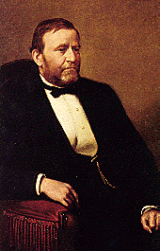 An Overview of Ulysses Grant's
Administration An Overview of Ulysses Grant's
AdministrationUlysses
Grant had gained fame as the hero of the Civil
War, and in 1868 became the first West Point
graduate to become President. But the qualities
that had brought him military glory were not
enough to solve the nation's problems in the
1870's. His enemies called him a poor President,
and historians have generally agreed.
Grant's presidency was clouded
by disgrace and dishonesty. Congressional
investigations revealed widespread corruption in
both state and local governments. Several of
Grant's major appointees became involved in
various scandals. Although Grant himself was so
honest that even his enemies never accused him of
being involved personally, they did revile him
for his seemingly complete lack of judgement in
his political appointments.
| Election of 1868 |
Election of 1872 |
| Place of Nominating
Convention |
Chicago |
Place of Nominating
Convention |
Philadelphia |
| Ballot on Which Nominated |
1st |
Ballot on Which Nominated |
1st |
| Democratic Opponent |
Horatio Seymour |
Democratic-Liberal Republican
Opponent |
Horace
Greeley |
| Electoral Vote |
214 to 80 |
Electoral Vote |
286 to *
(*Greeley died Nov. 29,
1872. His electoral votes were split
among 4 candidates.) |
| Popular Vote |
3,013,421 to 2,706,829 |
Popular Vote |
3,596,745 to 2,843,446 |
| |
| His Vice-President
and Cabinet |
| Vice-President |
Schuyler Colfax
Henry Wilcox (1873) |
| Secretary of
State |
Elihu B. Washburne
Hamilton Fish (1869) |
| Secretary of the
Treasury |
George S. Boutwell
William A. Richardson (1873)
Benjamin H. Bristow (1874)
Lot M. Morrill (1876) |
| Secretary of War |
John A. Rawlins
William T. Sherman (1869)
William W. Belknap (1869)
Alphonso Taft (1876)
James D. Cameron (1876) |
| Attorney General |
E. Rockwood Hoar
Amos T. Akerman (1870)
George H. Williams (1871)
Edwards Pierrepont (1875)
Alphonso Taft (1876) |
| Postmaster
General |
John A. J. Creswell
James W. Marshall (1874)
Marshall Jewell (1874)
James N. Tyner (1876) |
| Secretary of the
Navy |
Adolph E. Borie
George M. Robeson (1869) |
| Secretary of the
Interior |
Jacob D. Cox
Columbus Delano (1870)
Zachariah Chandler (1875) |
| |
|
| U.S. Events During
His Administration |
| Population in 1877
47,141,000 |
| 1869 |
Jay Gould, James Fisk,
Jr., and others tried to corner the gold
market, leading to a financial panic. |
| 1869 |
The President of the
Dominican Republic tried to sell his
country to the United States. |
| 1869 |
The Transcontinental
Railroad was completed. |
| 1870 |
The Fifteenth Amendment
to the Constitution gave all men the
right to vote, regardless of "race,
color, or previous condition of
servitude." |
| 1870 |
Congress made it a
federal crime to deprive anyone of his
civil or political rights by interfering
with the right to vote. |
| 1870 |
Congress established the
Department of Justice. |
| 1870 |
The United States
Weather Bureau was established. |
| 1871 |
The Indian Appropriation
Act ended tribal recognition and the
treaty system, and made all Indians wards
of the state. |
| 1871 |
The city of Chicago was
nearly burned to the ground in one of the
worst disasters in U.S. history. |
| 1872 |
The Geneva Tribunal of
1872 ruled that Great Britain should pay
the United States $15,500,000 for losses
caused by Confederate ships built in
Britain. |
| 1872 |
The Yellowstone area was
set aside by Congress as the first
national park. |
| 1873 |
Congress investigated
the relations of Credit Mobilier in
conjunction with the Union Pacific
Railroad. |
| September 1873 |
Several important
Eastern banks failed, touching off a
financial panic across the country. |
| 1873 |
Barbed wire was patented
by Joseph
Glidden. |
| 1874 |
Congress investigated
the Whiskey Ring. |
| 1874 |
The Women's Christian
Temperance Union was established in
Cleveland, Ohio. |
| 1875 |
The Hawaiian Reciprocity
Treaty made the islands a virtual
protectorate of the United States. |
| 1876 |
Secretary of War William
W. Belknap was impeached for accepting
bribes from a trader at an Indian post. |
| 1876 |
Indians massacred George
Custer and his troops in the Battle
of the Little Bighorn. |
| 1876 |
Colorado was admitted to
the Union as the 38th state. |
| 1876 |
Alexander Graham Bell
invented the telephone. |
| |
|
| World Events
During His Administration |
| 1869 |
The Suez Canal opened. |
| 1870 |
Canada bought vast
territories from the Hudson's
Bay Company. |
| 1870-1871 |
The Franco-Prussian War
resulted in the unification of Germany. |
| 1871 |
Heinrich Schliemann
discovered ancient Troy. |
| 1877 |
Queen
Victoria was proclaimed Empress of India. |

The American President. Miller Center of
Public Affairs at the University of Virginia. www.millercenter.virginia.edu/academic/americanpresident/grant
Presidents of the United States (POTUS). The
Internet Public Library. www.ipl.org/div/potus/usgrant.html

Chicago
Horace
Greeley
Joseph
Glidden
George
Custer
Hudson's
Bay Company
Germany
Queen
Victoria
India
Questions or comments about
this page?
|





